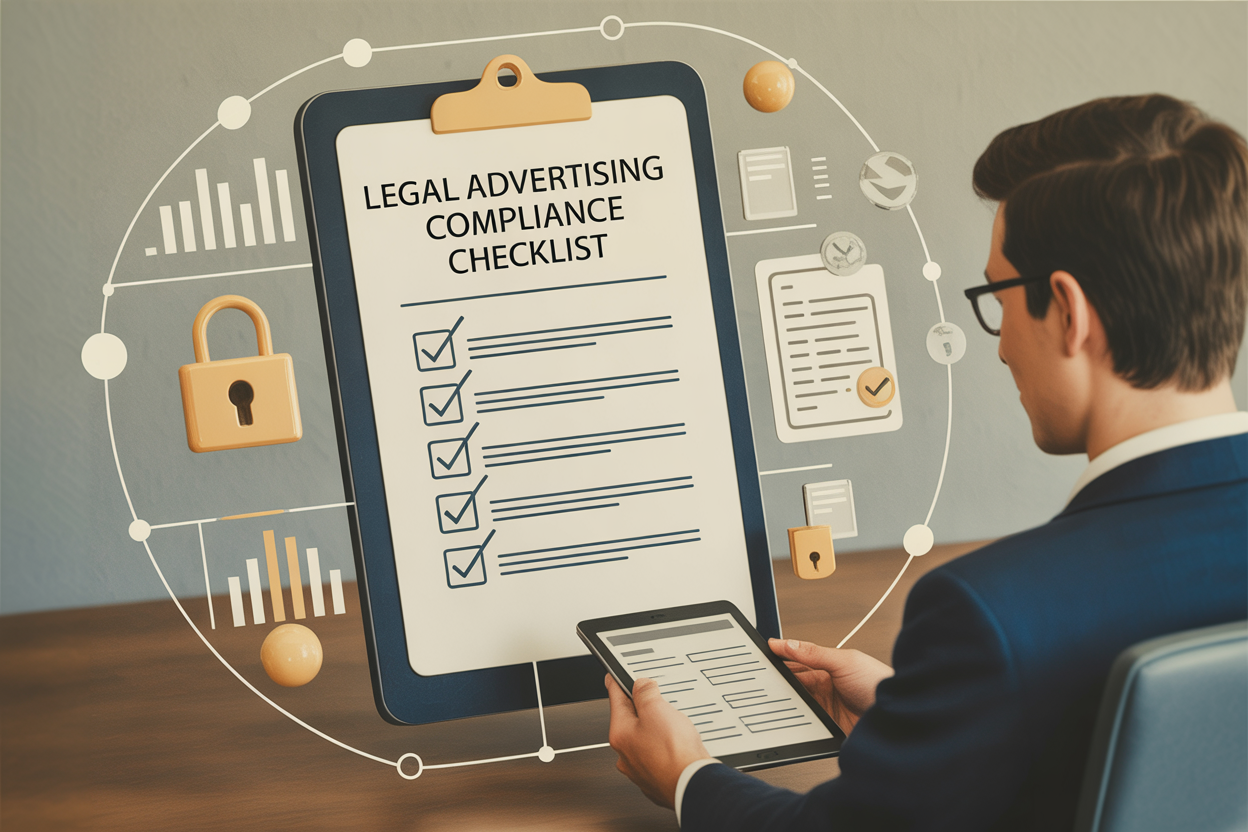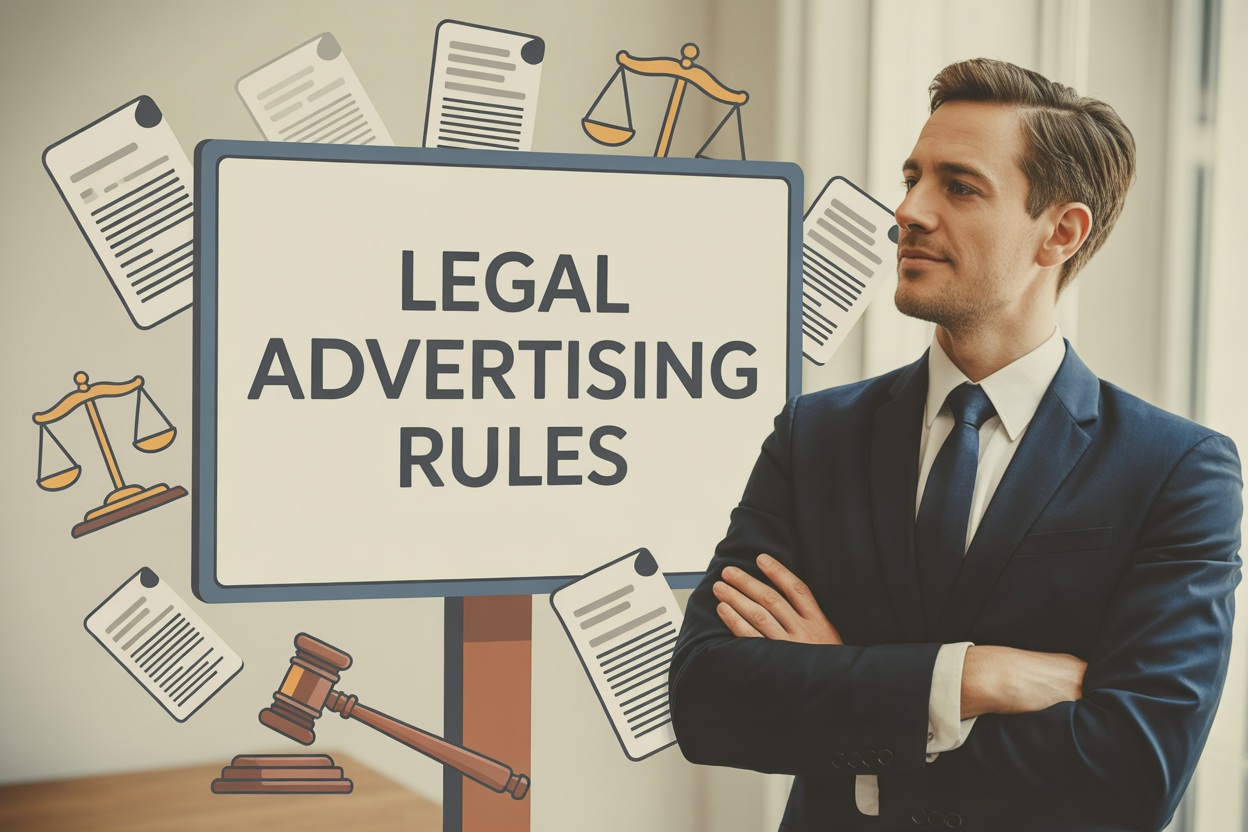With legal advertising spending hitting $2.5 billion in 2024 – about double what pizza restaurants spent on ads – law firms are running tens of millions of advertisements each year. With such volume, regulators are watching closely. When they catch violations, the consequences are real: the Florida Bar has warned lawyers that improper solicitation "could land you in very serious trouble," noting cases where attorneys were disbarred for soliciting vulnerable clients in hospitals.
Here's what you need to know to keep your marketing compliant, effective, and ethical – without sacrificing results.
What Are the Key Legal Advertising Rules for Lawyers?
Every attorney advertisement in the U.S. must stick to one overarching principle: truthfulness. The American Bar Association's Model Rule 7.1 is crystal clear: "A lawyer shall not make a false or misleading communication about the lawyer or the lawyer's services."
But truthfulness is just the starting point. There are several specific rules that actually help you create more effective marketing:
Identification Requirements: Every advertisement must clearly include the name and contact information of at least one attorney or law firm responsible for its content. This builds trust and accountability – something your potential clients probably care about more than you think.
Content Guidelines: Attorneys may advertise their services through any media – print, TV, radio, online, you name it. The catch? You must avoid content that creates unjustified expectations or guarantees of results. Statements that create unjustified expectations or unsubstantiated comparisons are usually forbidden.
Specialization Claims: You can't advertise yourself as a "specialist" or "expert" unless you have official certification or accreditation that backs up the claim. And if you do have certification, you need to name the certifying organization in your ad.
Referral Payments: Attorneys must not pay for referrals or give anything of value in exchange for someone recommending the lawyer's services (with limited exceptions we'll cover later).
Firm Names: Your advertised law firm names must not be misleading. You can use trade names in many states, but the name can't imply a connection to a public agency or include words like "Legal Aid" if you're a for-profit firm.
The bottom line is that attorney ads are allowed in all U.S. jurisdictions, but they're regulated to make sure they're honest and transparent. So before any ad goes live, you need to carefully vet every statement and implication against the ethics rules: Is it truthful? Is it misleading in context? Does it include the required identifiers and disclaimers?
How Does the American Bar Association Influence These Rules?

The ABA plays a role that's probably bigger than you realize, even though the ABA does not directly enforce these rules. State bars and courts do the enforcement. But the ABA develops the Model Rules of Professional Conduct, which serve as the template that state jurisdictions use when writing their own attorney conduct codes.
At its 2018 annual meeting, the ABA adopted sweeping amendments to the advertising rules to simplify them and eliminate outdated provisions. These changes were "long overdue" in the face of modern marketing via the internet and social media.
The core principles remained – no false or misleading ads – but the rules got streamlined. The revised Rule 7.2 (2018) consolidated various restrictions and explicitly allowed nominal "thank-you" gifts for referrals, and Rule 7.3 was clarified to prohibit "live person-to-person" solicitation while allowing more flexibility in written or digital outreach.
Here's what matters for your compliance program: almost all states pattern their lawyer advertising rules on the ABA Model Rules. When you're looking at advertising rules, you'll find that the ABA Model Rules' language on ads is mirrored in your state's rulebook about 90% of the time. The remaining 10% might be state-specific tweaks.
What Role Does the State Bar Association Play in Regulation?
While the ABA provides the model, state bar associations are the ones who actually implement and enforce advertising rules. Each state has its own Rules of Professional Conduct that include advertising and solicitation provisions, usually based on the ABA's template.
State bars often have dedicated committees or counsel for advertising compliance. Florida, for example, has a Standing Committee on Advertising that reviews lawyer ads. In fact, Florida requires lawyers to file many of their advertisements for review 20 days before dissemination – one of the strictest regimes in the country.
The enforcement by state bars includes a range of actions. If a lawyer's ad is found non-compliant, the bar might initially send a warning or require the lawyer to take it down or correct it. In more serious cases, the bar can pursue formal discipline ranging from a private reprimand to suspension of the lawyer's license, or even disbarment for repeat offenders.

The level of enforcement can vary by state and over time. Ethics experts observe that some states are more active than others – Florida and Texas historically have been very active in policing lawyer ads, whereas other jurisdictions might rarely discipline lawyers for advertising unless the conduct is truly blatant.
State bar associations also issue ethics opinions and guidelines that clarify the rules. The Florida Bar has a 50-page Handbook on Lawyer Advertising and Solicitation, and states like Louisiana and New York have detailed guidelines with examples of compliant and non-compliant ads.
One more point: state bars are increasingly aware of interstate advertising – lawyers licensed in one state might advertise on the internet reaching people in another. Generally, a state can discipline a lawyer licensed there for violating its ad rules even if the ad appears elsewhere.
What Are the Rules of Professional Conduct for Advertising?
The Rules of Professional Conduct (RPC) in each jurisdiction set forth the specific standards for lawyer advertising. While wording varies by state, these rules usually cover several major areas:
Communication Must Be Truthful (RPC 7.1): This foundational rule prohibits false or misleading statements about a lawyer's services. It applies to all communications about services, whether it's a billboard, website, social media post, or even a firm brochure. The rule often includes commentary explaining that misleadingness can be by omission or implication – a literally true statement can still violate the rule if it omits a fact necessary to make the overall message not misleading.
Advertising Regulations (RPC 7.2): This rule typically governs how lawyers may advertise. Key provisions include allowing advertising through any medium, requiring the inclusion of the name and address/contact of a responsible lawyer or firm in the ad, and forbidding compensation for recommendations (with exceptions for normal ad costs, legal service plans, referral services, etc.).
Direct Solicitation (RPC 7.3): The rules draw a line between general advertising and solicitation (targeted, direct contact with a specific prospective client). The rule says a lawyer shall not solicit professional employment via live person-to-person contact when the motive is the lawyer's gain, unless the person contacted is a lawyer, a family member, a close personal/former client, or someone who routinely uses legal services. This means no "ambulance chasing" – showing up uninvited at a hospital or calling someone at home after seeing their name in a police report is forbidden.
Fields of Practice and Specialization (RPC 7.4): This rule allows lawyers to communicate what areas of law they practice and if they have any certifications. But a lawyer should not claim to be "certified" or "specialized" unless it's true in the formal sense.
The Rules of Professional Conduct on advertising boil down to: be truthful, include necessary identifying information, avoid unwarranted claims or personal solicitation, and follow any specific directives your jurisdiction has given for format and content.
How Can Law Firms Avoid Making False or Misleading Claims?

Avoiding false or misleading claims is the cornerstone of legal advertising compliance. In practice, this means law firms should adopt a very fact-based, transparent strategy to any statements in their ads.
Stick to Verifiable Facts: Only include claims in your advertisements that you can objectively substantiate. Superlatives or comparative claims (e.g., "We're the toughest trial lawyers in town") are inherently suspect because they're hard to prove and can mislead consumers. Many states flatly prohibit comparisons of lawyers' services unless the comparison is "factually substantiated". A safe practice is to focus on factual descriptions: years of experience, number of cases handled, past positions, languages spoken, etc.
Avoid Guarantees and Predictions: Any language that promises a specific outcome or even hints at guaranteed success will be deemed misleading. The Florida rules ask: "Does the advertisement contain any information that can reasonably be interpreted as a prediction or guarantee of success or specific results?" – if yes, it violates the rule.
Provide Context for Results: Many law firms like to advertise their big wins or settlements. While you can reference truthful past results, you must do so in a way that isn't misleading about your abilities or the typical outcome. The ABA commentary cautions that advertising past case results can create an "unjustified expectation" in the viewer's mind. To avoid this, firms should include a disclaimer like "Past results do not guarantee future outcomes" when mentioning verdicts or settlements.
Use Disclaimers Proactively: Disclaimers are your friends in preventing misunderstandings. Examples of useful disclaimers include: "Attorney Advertising" (to flag that a message is a promotional contact), "Prior results do not guarantee a similar outcome" (for any mention of successes), and "Not certified by [State] as a specialist" (if using terms like "specializing in X" without a formal certification).
Review by Others (Ethics Filter): It's wise to have someone not involved in the marketing copy – ideally another attorney or an ethics advisor – review the advertisement with a critical eye. As one ABA ethics expert put it, ask yourself if the advertising is false, deceptive, or misleading – if you can confidently say "no" to those, you're usually good to go.
Tell the Truth, Plainly: Use clear, plain language and don't omit important details. Remember that omissions can be misleading too. The rules say a truthful statement is misleading if it "omits a fact necessary to make the statement considered as a whole not materially misleading."
What Are the Consequences of Making False or Misleading Statements?

The consequences for violating legal advertising rules can be quite serious, both legally and professionally:
Bar Disciplinary Action: State ethics committees treat false or deceptive advertising as professional misconduct. After investigation, a lawyer could receive sanctions ranging from a formal reprimand to suspension of your law license, or even disbarment in extreme cases. For example, in Florida, a lawyer who solicited a catastrophically injured patient in a hospital was disbarred.
Damage to Reputation and Civil Liability: Being caught for false advertising can severely damage a lawyer's reputation. Disciplinary actions are often public. Moreover, if a client was truly misled and harmed, the lawyer could face a civil lawsuit from that client for misrepresentation or fraud.
Regulatory Investigations: Extremely deceptive lawyer advertising could draw attention from government regulators like the Federal Trade Commission (FTC) or state Attorneys General under consumer protection laws. Since the late 1990s, the FTC has brought over 200 cases against false or misleading advertising.
Mandatory Ad Pre-Approval or Probation: In some disciplinary outcomes, lawyers are put on probation where any ad they want to run for a certain period must be submitted to a bar committee for review and approval.
It's worth noting that actual enforcement levels vary. Statistics suggest that advertising-related grievances are a relatively small portion of total disciplinary complaints. In one state's recent annual report, "Advertising Conduct" made up less than 1% of all alleged misconduct complaints. But low frequency isn't much comfort if you end up in that 1%.
How to Use Your Firm Website for Advertising?
A law firm's website is often its most powerful advertising tool – it's essentially a 24/7 digital brochure and point of contact for potential clients.
Make it Informative and Transparent: Your website should clearly convey who you are, what services you offer, and where you practice. Prominently display the firm's name, address, phone number, and email. A surprising statistic: only 87% of law firms have a website as of 2023, which means 13% of firms are virtually invisible online.
Incorporate Essential Disclaimers and Notices: Every law firm website should contain certain legal notices to manage expectations and comply with rules. Two of the most important are the general information disclaimer and the no attorney-client relationship disclaimer. For example, you might have a disclaimer that says: "The information on this site is for general informational purposes only and is not legal advice. Viewing this site or contacting the firm through this site does not form an attorney-client relationship."
Showcase Qualifications Without Exaggeration: Your website is a great place to highlight your experience, case results, publications, client testimonials, etc. Just do so carefully. It's perfectly fine to list factual achievements: e.g., "Recovered $2.5 million in [Case Type] (2022)" or "John Doe, selected to Super Lawyers 2023." But remember to add context or disclaimers as needed.
Use Content Marketing (Ethically): Many firms use their websites to host blogs, articles, FAQs, videos, or other content that draws in potential clients via useful information. This is smart marketing and also serves an educational purpose. Ethically, it's allowed. Just ensure you don't inadvertently give specific legal advice or create an expectation of representation. It's worth noting that 29% of law firms with blogs reported that a client retained them because of their blog content.
Optimize for Client Experience and Compliance: Treat your website as both a marketing tool and an intake tool. Ensure it has an easy way for potential clients to contact you. But here, implement compliance measures: for instance, if you use a live chat bot, program it with a greeting that includes a mini-disclaimer.
As of 2023, 35% of lawyers reported that a client retained them directly through the firm's website (up from 25% a year prior). That's a rising trend.
Legal Advertising Compliance Checklist

Below is a checklist of items to review for any lawyer advertisement to help ensure compliance with common U.S. legal advertising rules:
✔️ Include Required Identifying Information: Does the ad clearly include the name of at least one attorney or law firm responsible for its content and a way to contact them?
✔️ Truthfulness and No Misleading Content: Review every statement. No false or misleading statements or omissions should be present. Ask: Would a layperson get any incorrect impression from this?
✔️ No Unfounded Predictions or Promises: The ad should not contain any prediction or guarantee of success. Phrases like "you will get big $$$" or "we always win" are improper.
✔️ Avoid Unverifiable Comparisons or Superlatives: Remove or qualify statements that compare your services to other lawyers or self-laudatory terms that aren't objectively verifiable.
✔️ Specialty Claims Compliant: If the ad uses words like "expert," "specialist," or "certified," ensure that you are in fact certified by an appropriate body and that the name of the certifying organization is included.
✔️ Testimonials and Endorsements: If using client testimonials or endorsements in the ad, verify they are truthful and from actual clients and that the person's experience is described accurately.
✔️ Required Labels and Disclaimers: Ensure any required wording or disclaimer is included, exactly as mandated. For example, if your state requires "Attorney Advertising" on certain written solicitations, is it there and in the proper format?
✔️ Solicitations – Additional Compliance: For direct solicitations, have you observed any waiting period applicable in the jurisdiction?
✔️ Retain Copies: Internally, make sure you retain a copy of the ad and a record of its distribution for the period required by your state.
✔️ Overall Tone and Dignity: While not a black-letter requirement in all states, a good final check is whether the ad is presented in a dignified and professional manner.
Final Thoughts
Advertising and marketing in the legal industry, just like with any other heavily regulated industry, have changed, especially in recent years, and they have become essential parts of a successful law practice. A great advertising strategy can empower law firms – particularly those serving highly regulated sectors like fintech, banking, or investment advisory – to reach the right clients while maintaining the trust and integrity that underpin the attorney-client relationship.




